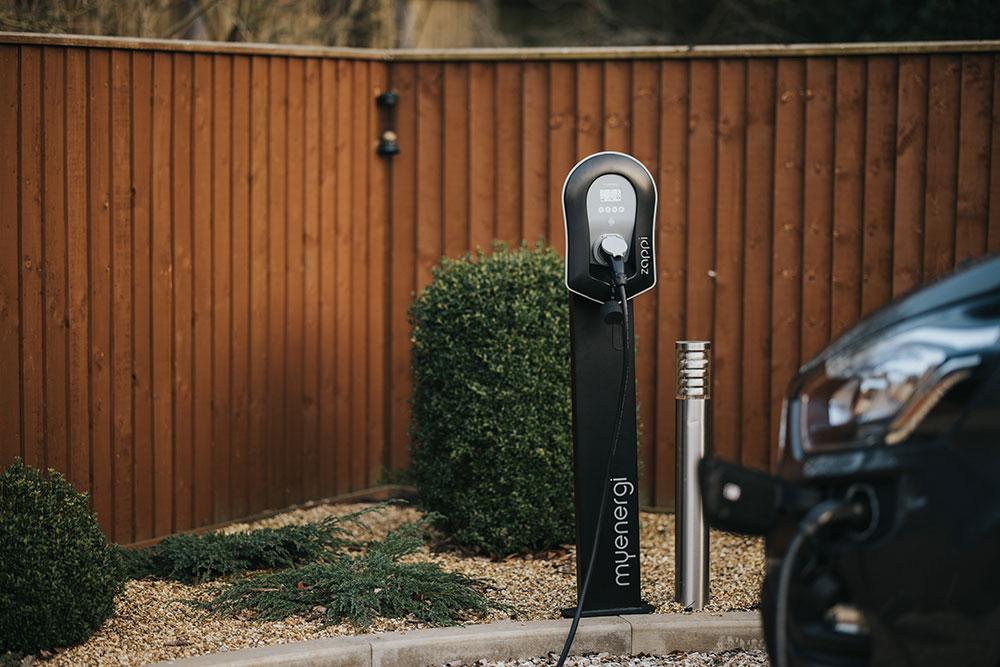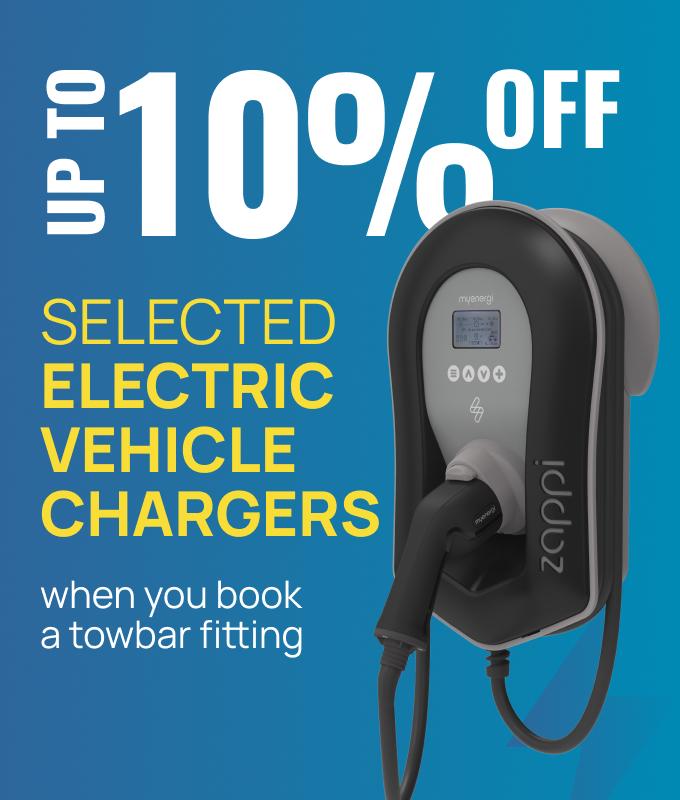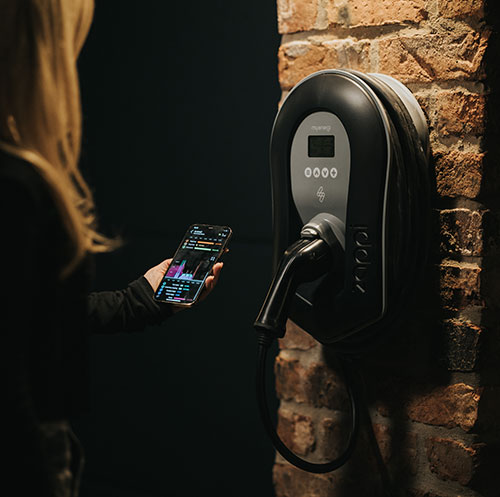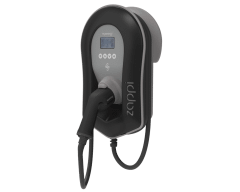How to charge your EV!
There are thousands of free electric car charge points throughout the UK, often located in supermarkets, shopping centres and public car parks.
Charging an EV can be anything between 30-60 minutes and 8-10 hours. How long it takes to charge your electric car depends on the car’s battery size, how many miles you do between charges, your charging behaviour, and the power rating of the charger you’re using.
There are three main types of chargers:
1. Slow - usually rated up to 3kW, is mainly used to charge overnight at home or your workplace. It takes 8-10 hours to charge fully.
2. Fast-rated at either 7kW or 22kW and can usually be found in car parks, supermarkets, and leisure centres. It takes 3-4 hours to charge fully.
3. Rapid - typically rated from 43kW and found at motorway service stations, petrol stations, and supermarkets. It takes 30-60 minutes to charge fully but is only compatible with rapid-charging function EVs.
Get an EV Charger Installed
How it Works
Choose Your EV Charger
Find the right charger on our website using our helpful guide
Organise an Installer
We help you find a qualified electrician with specialised EV Charger training
Hit the road and enjoy a new freedom
What are the different types of Charging Stations?
Untethered – An untethered EV charger doesn't have a charging cable permanently attached to it, and provides greater flexibility than a tethered charger. Some electric cars come with their own charging cable, but most of the time, you'll need to buy a charging cable separately when you purchase an untethered unit.
- Untethered Pros:
- If you need a different connection type or a longer cable, you can buy a new cable without having to pay to replace the entire charging unit.
- The untethered cable can be stored away so that the unit looks tidier.
- It gives you more flexibility as you can take the untethered charging cable with you when you travel.
- Untethered Cons:
- Usually, the cable must be bought separately from the untethered charger.
- You have to attach the cable before charging and detach it after charging, meaning it is less convenient than a tethered charger.
- Depending on where you store the cable when it's detached, you may have to clean it regularly to avoid bringing any dirt inside.
Tethered – Comes with a permanently attached charging cable. The tethered charger is probably the most convenient of the two options as it requires minimal effort when charging your electric car.
- Tethered Pros:
- The tethered cable will be included in the overall price of the unit.
- Tethered EV chargers are convenient as you simply uncoil the attached cable and plug it into your vehicle.
- The cable is permanently attached, meaning it is much less likely to be stolen than an untethered cable.
- Tethered Cons:
- You'll be limited to the length of cable supplied by the manufacturer. If you need a charging cable with more length, this will come at an extra cost.
- A tethered charger is restricted to either Type 1 or Type 2 charging connections.
Most EVs are supplied with two cables for slow and fast AC charging; one with a three-pin plug and the other with a Type 2 connector charger side, and both are fitted with a compatible connector for the car’s inlet port. These cables enable an EV to connect to most untethered charge points while using tethered units requires using the cable with the correct connector type for the vehicle.
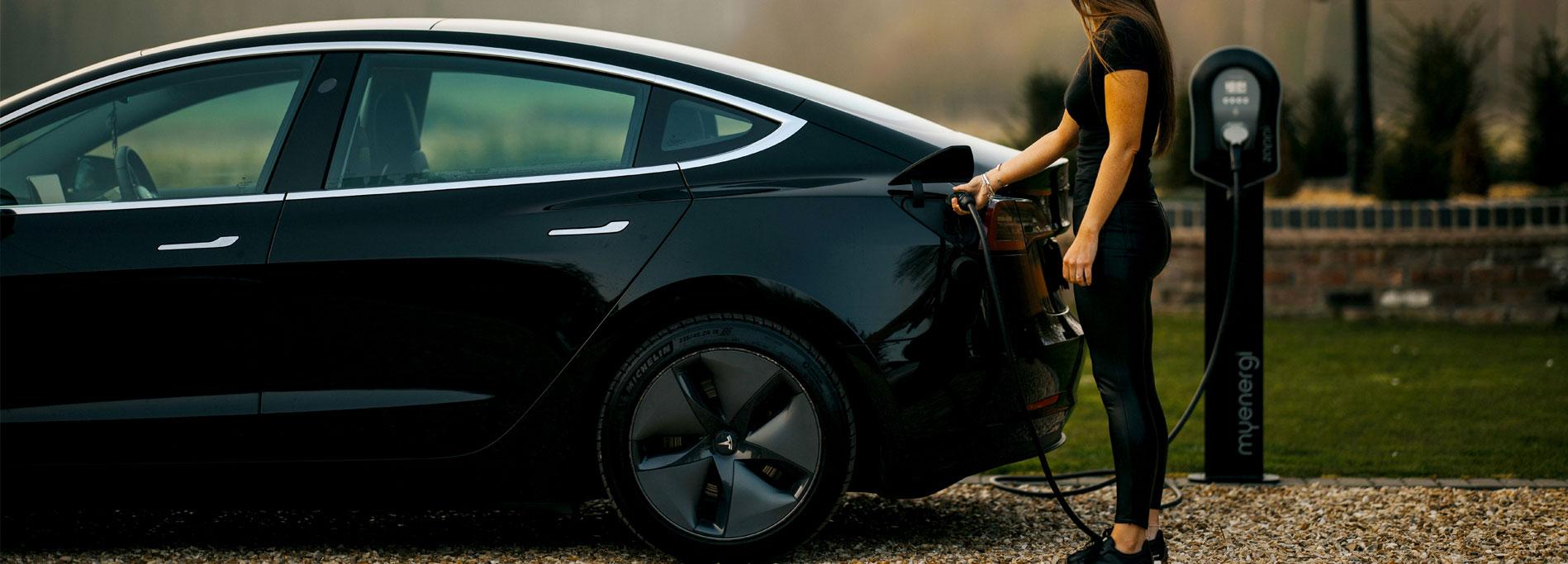
What are the different types of Electric Vehicles?
BEV – Battery Electric Vehicles: These are referred to as ‘all-electric vehicles’ or ‘pure electric vehicles and run entirely on electricity only; they have no gasoline engine. BEVS are zero-emission vehicles with a driving range of 50 – 250 miles.
PHEV – Plug-in Hybrid Vehicle: These vehicles use batteries to power an electric motor and incorporate an internal combustion engine to recharge the batteries to enable a more extended driving range. A PHEV typically runs on electricity stored in the battery until nearly depleted. When no electricity is available, a PHEV can run on fuel alone.
HEV – Hybrid Electric Vehicles: Known as self-charging hybrids, they use an internal combustion engine and an electric motor, which uses electricity stored in a battery pack. The main difference between an HEV and a PHEV is that you cannot plug an HEV into an EV charger. Instead, the onboard battery pack is charged via the engine and regenerative braking.
FCEV – Fuel Cell Electric Vehicles: These vehicles create zero tailpipe emissions powered by hydrogen. An FCEV uses a similar system as a BEV to run the car; however, the energy is stored as hydrogen and then converted into electricity by the fuel cell to propel the vehicle.
What are the benefits of Electric Vehicles?
The primary benefit of electric cars is their contribution to improving air quality in towns and cities. With no tailpipe, pure electric vehicles produce no Carbon Dioxide emissions when driving, reducing air pollution considerably.
According to the Mayor of London, road transport accounts for around half of the capital’s air pollution. It’s no wonder the UK Government and local councils want to accelerate the number of electric cars on the roads. The UK Government has set a target that the sale of petrol and diesel cars will be banned by 2040. The government is also looking to reduce carbon emissions to zero by 2050, and electric vehicles will play a significant role.
The production of electric cars does use a lot of energy initially; however, even after taking battery manufacture into account, electric cars are still a greener option. This is because of the reduction in emissions created over the car’s lifetime.
Electric vehicles have many benefits, including:
- Cleaner environment
- No congestion charge
- Lower running costs
- Renewable electricity tariffs
- Better driving experience
- Government funding
- Free parking
- Reduced noise pollution
- Increased resale value
Can an Electric Cars have a Towbar?
The quick answer – is yes.
As long as you have checked the vehicle’s VIN plate to ensure that the car has a towing capacity, there is no reason you won’t be able to have a Towbar fitted.
If you’re unsure about how to find the VIN plate on your vehicle, follow this link!
It is worth remembering that the mileage your Electric Vehicle can travel on a full battery will vary depending on the weight of what you are towing.
Another variable regarding your vehicle’s driving range is the season – depending on the temperature, your vehicle’s range may change. Generally, you have a more extensive range in Summer and a smaller range in Winter.

OZEV grant schemes for the installation of your Electric Vehicle Chargers?
The Government offers grants to support the wider use of electric and hybrid vehicles via the Office of Zero Emission Vehicles (OZEV).
The OZEV EV Chargepoint grant allows people who live in rental accommodation or own a flat to reduce the cost of buying and installing a home charger by providing up to 75% funding towards the cost of installing electric vehicle smart chargepoints at domestic properties across the UK.
If you live in rental accommodation or own a flat and have not already claimed a charge point grant for your vehicle you may qualify for the grant. Please visit the full qualifying criteria on the government website here.
This information is subject to change. We recommend you please visit the GOV.uk website for more information.

